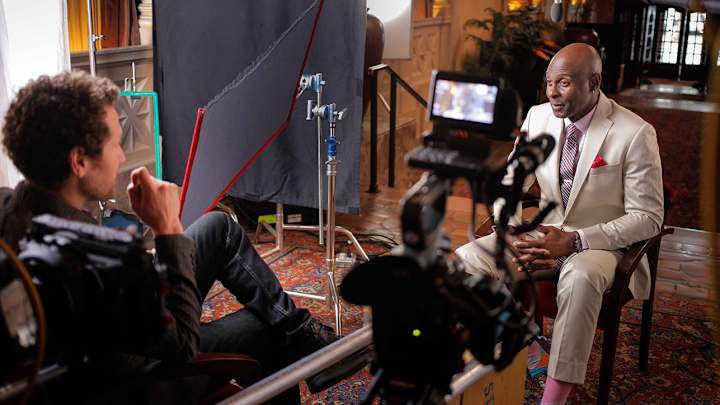'In Search of Greatness' Director Gabe Polsky on the Value of Creativity in Sports

What do Wayne Gretzky, Jerry Rice and Pelé have in common? For one, the legends appear in an ambitious new documentary In Search of Greatness, from director Gabe Polsky. But as the film makes clear, the similarities don't stop there. The documentary, which will be released in theaters in select major markets on Friday, seeks to uncover the secrets of athletic genius, with implications extending far beyond sports.
Ahead of the film's release, Polsky—the director of the acclaimed 2014 documentary film Red Army, about the Soviet Union's national hockey team—talked to SI about the value of creativity, his favorite athletes to watch and more.
This interview has been edited and condensed for clarity.
SI: Why did you pursue this project?
GP: These are kind of ideas and themes that I've been thinking about my whole life, since childhood. What is greatness, and how can it be cultivated? Both as an athlete and even now as a filmmaker, trying to achieve excellence but at the same time seeing all these systems that can stifle creativity.
A lot of kids get discouraged from doing sports because it's not fun, because coaches are narrow-minded—they don't make it fun. They don't know how to introduce creative ways to engaging their players or students. And as a result, a lot of kids who could have been great are turned away.
SI: Andre Agassi in his memoir talked about hating tennis and his father being a sort of drill sergeant. It was almost kind of the antithesis of a lot of what we heard from Wayne Gretzky in the film. How did you reckon with cases where greatness was achieved despite people not following some of the script that was laid out in the film?
GP: If you look closely enough, he looked like an eccentric out there with his long hair...the guy was rebelling. He was doing creative things out there that we had never seen, the way that he played. He was a compelling performer. That’s creativity. Maybe [his father] was a drill sergeant—so what? He practiced when he didn’t want to, but he was able to express creativity in other ways. He wasn’t the greatest of all-time, that’s why he wasn’t necessarily in my film, but he was creative.
SI: What are some of the commonalities you noticed in the fostering of creativity?
GP: I think that the allowance of kind of an encouragement of play and just sort of going out on the pond, or going in the backyard. That's where [greatness] comes from! It's not like doing these drills that these coaches come up with that are just like you're in the f------ military. There's no creativity. Do we want robots or do we want artists?
SI: As I watched the film, I found myself thinking a lot about the debate over U.S. Soccer player development in light of missing the World Cup.
GP: Look at France. They have a very diverse country and they played in this World Cup incredibly creative. I really felt that they were the best team right off the bat, because as a team they were incredibly creative together and in sync. Creativity doesn’t have to be individual; it is a collaboration. And everybody has to be on that same creative field. Look at Gretzky and Mario Lemieux, look at the Soviets. The Golden State Warriors.
It's a creative collaboration. It's a one-body movement as a team.
SI: In Search of Greatness is a sports documentary, but it's clearly a lot more than that—you reference The Beatles, David Bowie and Mozart. Why did you decide to reference music to the degree that you did?
GP: I wanted to show the audience that this isn’t about sports really, and kind of give them little cues to help them understand that this applies beyond sports and even beyond the arts. These musicians, the ones that succeeded, were rebellious, they were reinventing things, they were collaborating creatively. And they illustrate very similar points.
SI: Who are the athletes you watch right now whose artistry and creativity you admire?
GP: I appreciate the athletes that when they touch the ball or the puck, you know something interesting is going to happen. You get up on the end of your seat. You know the puck or the ball is in the hands of an artist. Like Patrick Kane, Odell Beckham, Connor McDavid. Obviously, Steph Curry and Golden State, just the way they play together.
SI: Did creating this documentary change the way you watch sports?
GP: No, because I’ve always been watching for [creativity]—ever since I was a little kid, when Jerry Rice had a diving catch and did it beautifully, or Wayne Gretzky had a move that you didn’t know how he did it. How did he even see that guy? Those are the moments when you are sitting down and you look at the guy next to you and you say holy s---, that was unbelievable. That was a moment that I was praying I would see.
